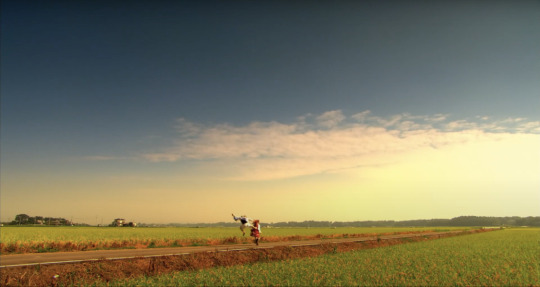#百物語
Text
youtube
⚠️Flashing
【PC Engine CD】 Hyaku Monogatari ~Honto ni Atta Kowai Hanashi~ | 百物語 ~ほんとにあった怖い話~ ~Intro
[ Kagome Kagome | かごめかごめ ]
// Game music: Munetaka Sakamoto | 坂本志崇
// MiSTer FPGA // TurboGrafx16 core // Y/C Composite // Sony KV-13TR20 CRT TV
0 notes
Text
前回の記事で記述した通りのラニーノーズ単独ですけど、はい、見ました。
遠いので配信で。
ただ、あれですよ。27時間テレビのかまいたちや千鳥、ダイアンの漫才と交互に見てました。(おいおい)
で、タイトル通りの感想てことですけど、思ったより怖くなかったなぁと。
怖いというか、なんでしょ。悲しいというか切ないかなと思いました。
で、あとグロいの苦手なんですけど、グロもあったりしたのが個人的にはちょっと「え」てなりましたけど。まぁ、大丈夫です。
そもそも論として、私は怖いの平気なんで。はい。
で、やはり安定の伏線回収。全部のコントと映画がリンクしてて「なるほど」と言った感じ。
計5回に渡って単独つくってきたみたいだけど、いや、山田監督すごすぎんか。作り込みスゴすぎる。
あと、洲崎さんの演技力もスゴすぎな。サイコパス感全開だなぁと。
ゲストのメンツが個性的で面白かった!
大体客席から笑いと悲鳴が上がるライブって斬新。
しばらくは単独やらないと口にしてたけど、またして欲しいねそのうち、。その時は大阪まで行けたらいいなぁ。
配信は25日12:00まで買えて、同日21:00まで視聴可能とのこと。
人気だったら延長がある場合があるから、買わなきゃでしょ。
https://t.co/Q64UTB2vI8
0 notes
Text








some of my favourite screen caps from the movie kamikaze girls 下妻物語 (2004)
#下妻物語#kamikaze girls#lolita fashion#baby the stars shine bright#shimotsuma monogatari#japanese yankee#yankii#old school lolita#momoko ryugasaki#ryugasaki momoko#竜ヶ崎桃子#ichigo shirayuri#shirayuri ichigo#白百合イチゴ#momoko x ichigo#懐古ロリ#ヤンキー#anna tsuchiya#kyoko fukada#深田恭子#土屋アンナ
1K notes
·
View notes
Quote
否定できないのは、これから昔気質の読者たちは少数派になるということだ。(中略)もしこの時代の趨勢に抗うことができないなら、もし本を読むことにこだわることで書店の経営を支えるのが難しいのであれば、「何か」をしながら読書するというライフスタイルを選ぶのも一つの方法だろう。それで読書を続けることができる。その「何か」はコーヒーを淹れることであろうと、ピザづくりであろうと、他人が理解できようが不満に思おうが、もう取るに足らないことだ。
台湾独立書店文化協会編著/フォルモサ書院訳・写真『台湾書店百年の物語──書店から見える台湾』(2022年9月、H.A.B)
4 notes
·
View notes
Text

#goodnight#good night#Yokai Monsters: 100 Monsters#妖怪百物語#Yōkai Hyaku Monogatari#One Hundred Yōkai Tales#antimimetic#Rokurokubi
1 note
·
View note
Text
ラーツー
Ramen Touring
5th May 2024
ハンバーグ師匠が美味そうに食べいたので😁
百草園(の入り口)経由で帰宅。
“Hamburg Shisho” was eating deliciously.
I passed in front of “Keiō Mogusaen” on my way home.






Dis:73.4km
Odo:8404.4km
#らーめん治#らいおんラーメン#百草園ショッピング��ンター#百草園#piaggio#vespa#px150#px150anniversario#montebianco#italianscooter#vespagram#vr46#valentinorossi#agv#agvhelmet#detective story#Kudo shunsaku#shogun#bad city#lonely man#ピアジオ#ベスパ#日伊国交樹立150周年記念#探偵物語#工藤俊作#工藤ちゃん
0 notes
Text
紺屋に来た化け物
阿波国に松屋五郎八という紺屋がある。
ある夜、子の刻の頃、五郎八は騒がしさに目を覚ました。
起き上がって、あちこち見て回ると、庭に何かがいた。
色は黒く、犬よりは大きい獣が、二本足で立ち、両手を上げて歩き回っている。
そいつは染物に使う糊をガツガツと食い尽くすと、家に上がり込んで灯火の油をベチャベチャと舐め始めた。
五郎八は恐ろしさのあまり、物陰からこっそり見ていることしかできなかった。
翌日、五郎八は昨夜見たものを近所の若者たちに語り、どうしたもんだろう、と溜息をついた。
血気盛んな彼らは、木刀や樫の棒など、各々得物を手にすると、五郎八の家に集まり、化け物が来たらぶち殺してやる、と物陰に隠れて夜を待った。
そして昨夜と同じ頃、化け物はやってきた。
化け物はあたりを見回し、糊が置いてある場所に近寄ってきた。
若者たちは一斉に物陰から跳び出し、化け物に打ちかかった。
化け物はぐるぐる走り回ってから、少し空いた戸の隙間を見つけると、そこから抜け出し、外へ逃げた。
逃してなるか、と若者たちはなおも追いかける。
やがて平山という所で化け物は大きな榎の中に隠れた。
何処へ隠れやがった、と若者たちがあたりを探し回ると、榎から火の玉が飛び出した。
これには若者たちも恐れをなし、大慌てで逃げ帰った。
その後は、化け物は二度と五郎八の家に来ることはなかったという。
しかし、如何なる化け物だったのだろうか。その正体はまったく判らない。
(菅生堂人恵忠居士『太平百物語』巻之五 「四十八 紺屋ばけ物の事」)
0 notes
Photo

高牆裡的貓 #百貓物語 #igdaily #igcats #bestoftheday #cat #iphonephotography #iphone12 #shotoniphone #natgeoyourshot #tamsui #newtaipeicity #taiwan #republicofchina #淡水 #新北市 #台灣 #中華民國(在 淡水 Tamsui) https://www.instagram.com/p/CqFmRBXhn87/?igshid=NGJjMDIxMWI=
#百貓物語#igdaily#igcats#bestoftheday#cat#iphonephotography#iphone12#shotoniphone#natgeoyourshot#tamsui#newtaipeicity#taiwan#republicofchina#淡水#新北市#台灣#中華民國
0 notes
Photo

ライオン王 < 虎。 #絵しりとり 見かけだけで実はそれほど強くないとか散々な言われよう。 #スケッチ #イラスト #illustration #ライオン #王様 #物語 #百獣の王 #動物 #獅子 #kinglion #manabeepic #イラストレーター https://www.instagram.com/p/Codv8Kmy-7e/?igshid=NGJjMDIxMWI=
0 notes
Text

The Hundred Ghost Stories That Led to My Death (僕が死ぬだけの百物語) // Anji Matono
164 notes
·
View notes
Text

[Image above: Kyoto Sanzenin Temple, statue of Mahāsthāmaprāpta]
What is the 23 nights temple? [Part 1]
Thank you for your continued support of the ‘A Message from 23 Nights Temple’ blog. We have received quite a few questions from our readers about the ‘23 Nights Temple’, so we would like to answer them here in two parts.
23 nights is one of the folk rituals on the night of a specific moon phase, such as the 13th, 15th, 17th or 19th night, to wait for the moon to rise, make offerings, eat and drink together. Hundreds of years ago, halls where these events used to be held were scattered all over Japan, but unfortunately most of them have now been demolished and replaced by parking lots and modern ossuaries, especially in urban areas. The moon-waiting rituals of the Mid-Autumn Moon, 15 Nights (Full Moon), are still practised today. Although most modern Japanese are agnostics, some ritual events incorporating Buddhism and Shintoism remain.
The moon phase on the 23rd night is the ‘waning moon’, the half moon after the full moon, when the left half of the moon appears to be shining. The moon on the 23rd night is characterized by appearing late, around midnight, and in some mountainous areas surrounded by mountains, it can appear as late as 1 a.m.
In moon-waiting, the object of worship was determined by the time of the lunar phase at which the event was held. The object of worship on the 23rd night was Mahāsthāmaprāpta (bodhisattva mahāsattva), who was also said to be the incarnation of the moon. The light of wisdom possessed by Mahāsthāmaprāpta was thought to illuminate everything, freeing people from suffering and giving them strength.
In Shinto, Tsukuyomi-no-mikoto (Ref) is another name for Mahāsthāmaprāpta. He is also known as the god of agriculture and fishery, due to his characteristic control over the moon calendar.
The widespread ritual of waiting for the moon on the night of the 23rd lunar phase can be attributed to the worship of Mahastamaprapta, the savior of all things.
In “ A Message from 23 Nights Temple,” one of those shrines is featured. However, 2 years ago, the shrine, built over 1,000 years ago, was removed and converted into a commercial ossuary (August 2022), and the monk who left many of his messages died at the same time, but we continue to present the Zen words he left behind.
And personally, I am posting this not quite as a religion, but with the hope that as many people as possible will remember the philosophy of the prehistoric people, who lived with a sense of the cosmos, worshipping nature and enjoying the beauty of flowers, birds, wind and moon.

『二十三夜堂』とは何ですか?[その1]
日頃から『二十三夜堂からのメッセージ』ブログをご愛読いただきありがとうございます。読者のみなさんから『二十三夜堂』についてご質問が多々ありましたので、ここでお答えしようと思います。
二十三夜とは、十三夜、十五夜、十七夜、十九夜などの一つで、特定の月齢の夜に、人々が集まって月の出を待ち、供物を捧げ、飲食を共にする民俗儀式のこと。数百年前までは、こうした行事が行われるお堂が日本各地に点在していたが、残念ながら現在ではそのほとんどが取り壊され、特に都市部では駐車場や近代的な納骨堂に取って代わられている。中秋の名月、十五夜(満月)の月待ちの儀式は、今日でも行われている。現代の日本人の多くは無宗教だが、仏教や神道を取り入れた儀式行事も残っている。
二十三夜の月齢は、左側半分が輝いて見える「下弦の月」、満月の後の半月のこと。二十三夜の月は深夜0時ごろに現れるのが特徴で、山に囲まれた地域では深夜1時ごろに現れることもある。
月待ちでは、行事を行う月年齢の時期によって崇拝の対象が決まっていた。二十三夜で礼拝したのは、月の化身ともいわれた「勢至菩薩 (せいしぼさつ、梵: マハースターマプラープタ) 」である。勢至菩薩が持つ智慧の光は全てを照らし、人々を苦しみから解放して力を与えると考えられていた。その名は文字通り「大いなる力の到来」を意味する。
神道における「月読命(つくよみのみこと: 参照)」は、勢至菩薩の別名。暦を支配するという特徴から、農耕や漁業の神としても知られている。
二十三夜の月待ちが人々の間に広まった理由は、万物を救済する勢至菩薩を崇拝の対象にしていたからだといわれている。
『二十三夜堂からのメッセージ』では、それらの一つを取り上げています。しかし、2年前、1000年以上前に建てられた祠は取り払われ、商業的納骨堂へと改装され(2022年8月)、またメッセージの数々を残した僧侶も同時期に亡くなっていますが、彼の残した禅語を継続してご紹介しています。
そして個人的には、宗教というよりは、自然を崇拝し、花鳥風月を愛で、宇宙を感じて生きていた先史時代の人々の哲学を、一人でも多くの人に思い出してもらいたいという思いで投稿しています。
92 notes
·
View notes
Text
WIP: Sun Wukong's Powers and Skills
I'm currently working on a comprehensive list of Sun Wukong's magic powers. Here is just a taste from chapters two to four.
Bold black = magic power
Bold red = acquired non-magic skill
Bold green = claimed magic power that is never actually demonstrated
Bold orange = inborn talent?
Ch. 2
Early education #1: human skills - “[H]e began to learn from his [senior immortal] schoolmates the arts of language and etiquette” (與眾師兄學言語禮貌) (Wu & Yu, 2012, vol. 1, p. 116).
- Note: We all know that Monkey failed his etiquette classes.
Early education #2: religious skills - “He discussed with them the scriptures and the doctrines; he practiced calligraphy and burned incense” (講經論道、習字焚香; i.e. ritual procedure) (Wu & Yu, 2012, vol. 1, p. 116).
Wukong’s knowledge of scripture and philosophy pops up a few times in the novel. For example, he subsequently becomes enraptured by Subodhi's lecture on the Dao and Chan (Wu & Yu, 2012, vol. 1, p. 116).
Early education #3: gardening skills - “In more leisurely moments he would be … hoeing the garden, planting flowers or pruning trees” (閑時即...鋤園、養花修樹) (Wu & Yu, 2012, vol. 1, p. 116).
Immorality (1st category) [1] - This is achieved via oral formulas (口訣) and breathing exercises (自己調息) at prescribed times (Wu & Yu, 2012, vol. 1, pp. 120-121).
- The stipulated Chinese hours are before zi (12:00-14:00) and after wu (12:00-02:00) (i.e. noon to midnight) (子前午後). However, historical real world practice is reversed: after zi and before wu (i.e. midnight to noon).
Adeptness (i.e. quick learning) - “But this Monkey King was someone who, knowing one thing, could understand a hundred!” (這猴王也是他一竅通時百竅通) (Wu & Yu, 2012, vol. 1, p. 122).
First learns the “Multitude of Terrestrial Killers” (地煞數; a.k.a. “72 changes,” 七十二般變化) - This requires oral formulas (口訣, a.k.a. “oral spells,” 咒語) (Wu & Yu, 2012, vol. 1, p. 122).
- This sometimes requires a magic hand sign and a shake of the body (see below).
First attempt at “Cloud-Soaring” (騰雲) - Subodhi mockingly calls this “Cloud-Climbing” (爬雲) (Wu & Yu, 2012, vol. 1, p. 122).
First learns the “cloud somersault” (觔斗雲) - This requires a magic sign, an oral spell, a fist clinch, and a body shake (捻著訣,念動真言,攢緊了拳,將身一抖). It takes him 108,000 li (里) in a single leap (Wu & Yu, 2012, vol. 1, p. 123).
- 108,000 li = 33,554 mi or 54,000 km [2]
Multitude of Terrestrial Killers (i.e. 72 changes) - This requires a magic sign (捻著訣) and an oral spell (咒語). He transforms into a pine tree (Wu & Yu, 2012, vol. 1, p. 124).
Cloud somersault - He flies from the Western Continent to Flower-Fruit Mountain (i.e. from one side of the world to the other) “in less than an hour” (消一個時辰) (Wu & Yu, 2012, vol. 1, p. 125).
First use of the “body beyond body” (身外身法; a.k.a. “magic of body division,” 分身法) (i.e. hair clones) - This requires chewing and a “change!” (變) command. Small clone monkeys are used to overwhelm and beat up a monster who is three zhang (三丈) (31.29 ft / 9.53 m) tall (Wu & Yu, 2012, vol. 1, p. 128). [3] A passage explains:
- “For you see, when someone acquires the body of an immortal, he can project his spirit, change his form, and perform all kinds of wonders [出神變化無方]. Since the Monkey King had become accomplished in the Way, every one of the eighty-four thousand hairs on his body could change into whatever shape or substance he desired” (Wu & Yu, 2012, vol. 1, p. 128).
- 原來人得仙體,出神變化無方。不知這猴王自從了道之後,身上有八萬四千毛羽,根根能變,應物隨心。
Cloud somersault - He flies 30 or 50 monkeys and property (pots, bowls, utensils, etc.) home from captivity to Flower-Fruit Mountain (Wu & Yu, 2012, vol. 1, p. 129).
Ch. 3
Martial arts (武藝) - He “teach[es his monkeys] how to sharpen bamboos for making spears, file wood for making swords, arrange flags and banners, go on patrol, advance or retreat, and pitch camp” (Wu & Yu, 2012, vol. 1, pp. 131-132).
- 教小猴砍竹為標,削木為刀,治旗幡,打哨子,一進一退,安營下寨 …
Cloud Somersault - He flies east from Flower-Fruit Mountain over “200 li of water in no time” (霎時間過了二百里水面) to the Eastern Continent (Wu & Yu, 2012, vol. 1, p. 131).
Blows a mighty wind (陣風) - This requires a magic sign (捻起訣來), an oral spell (咒語), and taking a deep breath (Wu & Yu, 2012, vol. 1, pp. 131-132). A poem states that it puts the world into chaos:
- Thick clouds in vast formation moved o'er the world;
Black fog and dusky vapor darkened the Earth;
Waves churned in seas and rivers, afrighting fishes and crabs; Boughs broke in mountain forests, wolves and tigers taking flight.
Traders and merchants were gone from stores and shops.
No single man was seen at sundry marts and malls.
The king retreated to his chamber from the royal court.
Officials, martial and civil, returned to their homes.
This wind toppled Buddha's throne of a thousand years
And shook to its foundations the Five-Phoenix Tower (Wu & Yu, 2012, vol. 1, p. 132).
- 炮雲起處蕩乾坤,黑霧陰霾大地昏。
江海波翻魚蟹怕,山林樹折虎狼奔。
諸般買賣無商旅,各樣生涯不見人。
殿上君王歸內院,階前文武轉衙門。
千秋寶座都吹倒,五鳳高樓幌動根。
Body beyond body (i.e. hair clones) - This requires chewing and a “change!” (變) command. The small clone monkeys carry an armory’s worth of weapons (Wu & Yu, 2012, vol. 1, p. 132).
Magic of displacement (攝法) - This is a spell that carries the weapon-laden monkeys on wind (Wu & Yu, 2012, vol. 1, p. 132).
Monkey claims to have a number of supernatural powers:
- “I have the ability of seventy-two transformations. The cloud somersault has unlimited power. I am familiar with the magic of body concealment (身遯身, a.k.a. 隱身法) and the magic of displacement. I can find my way to Heaven or I can enter the Earth. I can walk past the sun and the moon without casting a shadow, and I can penetrate stone and metal without hindrance. Water cannot drown me, nor fire burn me” (Wu & Yu, 2012, vol. 1, p. 133).
- 我自聞道之後,有七十二般地煞變化之功,觔斗雲有莫大的神通;善能隱身遯身,起法攝法。上天有路,入地有門;步日月無影,入金石無礙;水不能溺,火不能焚。
Magic of water restriction (閉水法) - He travels to the Dragon Kingdom (Wu & Yu, 2012, vol. 1, p. 133).
Super strength - He effortlessly toys with a 3,600 catty (斤) (4,682.61 lbs / 2,124 kg) battle fork and a 7,200 catty (9,365.23 lbs / 4,248 kg) halberd (Wu & Yu, 2012, vol. 1, p. 134). [4]
Super strength - He lifts the 13,500 catty (斤) (17,559.81 lbs / 7,965 kg) iron pillar in the dragon treasury (Wu & Yu, 2012, vol. 1, p. 135).
Opens a waterway (開水道) - He uses the magic of water restriction to return to Flower-Fruit Mountain (Wu & Yu, 2012, vol. 1, p. 137).
First use of the “Magic Method of Modeling Heaven on Earth” (法天像地的神通), a 10,000 zhang (萬丈) (104,300 ft / 31,800 m) tall giant form - This requires bending over and screaming “grow!” [長!]. This form has:
- “[A] head like the Tai Mountain and a chest like a rugged peak, eyes like lightning and a mouth like a blood bowl, and teeth like swords and halberds” (Wu & Yu, 2012, vol. 1, p. 138).
- 頭如泰山,腰如峻嶺,眼如閃電,口似血盆,牙如劍戟
Immorality (2nd category) - This is achieved by inking out his name from the ledgers of hell [生死簿子] (Wu & Yu, 2012, vol. 1, p. 141).
Ch. 4
Cloud somersault - It is much faster than those of ordinary immortals (Wu & Yu, 2012, vol. 1, p. 145).
Travel to heaven - Refer back to ch. 3-#6A (Wu & Yu, 2012, vol. 1, p. 145).
First use of “three-headed and six-armed” (三頭六臂) war form - This requires a “change!” (變) command (Wu & Yu, 2012, vol. 1, p. 155).
Staff multiplication - This is done millions of times over (以一化千千化萬) to face Nezha’s own countless weapons (Wu & Yu, 2012, vol. 1, p. 156).
- The multitude of armaments are said to “clash like horned-dragons flying in the air” (cf. Wu & Yu, 2012, vol. 1, p. 156).
Body beyond body (i.e. hair clones) - This requires a “change!” (變) command. Monkey creates an autonomous decoy to distract Nezha while he slips behind him to land a staff blow (Wu & Yu, 2012, vol. 1, p. 156).
Immortality (3rd category) - This is achieved via heavenly imperial wine (御酒, a.k.a. “Immortal wine,” 仙酒 and “juices of jade,” 玉液瓊漿) (Wu & Yu, vol. 1, p. 159, 165, and 167).
I'm currently on chapter 16, so it will take me a while to finish, especially since I'm simultaneously gathering info for several other articles, including mirrored essays for Zhu Bajie and Sha Wujing.
Once I've gone through all 100 chapters, I will put each instance of a particular power into its own category (transformation, super strength, hair clones/tools, etc.) and then analyze everything as a whole. The Google Doc containing the list of powers will be attached to the analysis.
This project was partly inspired by a previous effort made by @the-monkey-ruler.
I'm open to feedback.
Notes:
1) In place of using “layer” or “level,” I’m choosing to designate his various immortalities as “categories.” This is because a new layer of divine longevity or durability would surely be added for each immortal peach, elixir pill, or cup/jug of heavenly wine consumed. Hence, eating multiple peaches would be one category, eating multiple elixir pills would be one category, and so on and so forth.
2) It’s important to note that 108,000 li is a metaphor for instant enlightenment (see section III here). Therefore, power-scalers should not use any instance of this as a feat.
3) One zhang (丈) comprises ten chi (尺, a.k.a. "Chinese feet"), and during the Ming Dynasty, one chi was roughly 12.3 in or 31.8 cm. This makes one zhang 10.43 ft or 3.18 m (Jiang, 2005, p. xxxi).
4) During the Ming, one catty (jin, 斤) was 590 grams (Elvin, 2004, p. 491 n. 133).
Source:
Elvin, M. (2004). The Retreat of the Elephants: An Environmental History of China. New Haven (Conn.): Yale University Press.
Wu, C., & Yu, A. C. (2012). The Journey to the West (Vols. 1-4) (Rev. ed.). Chicago, Illinois: University of Chicago Press.
#Sun Wukong#Monkey King#Journey to the West#JTTW#Monkey King powers#Sun Wukong powers#Lego Monkie Kid#LMK
96 notes
·
View notes
Text


















(Sold) 皮雕側背包改製成2只長夾-1 野貓刀疤王 lol Meow~* — recent works of 2 long-wallets, this's the one of.
◠‿◠ Done. Meow /ᐠ。‸。ᐟ\ ♫
似火風起舞
隱於深山谷
橙黃紅疊綠
情歸無一處
─ 山谷野百合 ‧ 仲茵 poem - Lily of the Valley by Chu Lan~*
📌 在華人世界,百合花代表吉祥如意。在西方,百合花是聖潔的象徵。在羅馬神話中,百合是在結婚與家庭的守護神朱諾的乳汁中誕生的。而在聖經上,百合花則是被逐出伊甸園的夏娃,悔恨傷心的眼淚落在地上後長出的。因此在復活節那天,潔白美麗的百合花,是祭典上裝飾最佳的花卉,並用來獻給聖母的花。耶穌曾持天堂之花 - 百合花作為給信徒的禮物;所以它更象徵忠貞與純潔。
在中國古代,由於百合花開時,常散發出淡淡幽香,所以百合和水仙、梔子、梅、菊、桂花和茉莉等花在一起的圖案合稱七香圖。
▪︎ 野百合的花語:永遠幸福、幸福又將回來、清新、浪漫、真誠。
▪︎ 橙色百合花花語:自信、勇氣、驕傲、勝利、榮譽和富貴的象徵,是自然的顏色。取其代表著力量、智慧、震撼、光輝、知識和性能力。
youtube
潘越雲 Michelle Pan (A Pan)【野百合也有春天 Springtime For The Wild Lilly】 on YouTube - 滾石唱片 ROCK RECORDS @RockRecordsTaipe
歌曲製作人:李壽全
作詞作曲:羅大佑
編曲:陳志遠
1983年 電影《野雀高飛》主題曲 (Lyrics)
========================
彷彿如同一場夢,我們如此短暫的相逢;
你像一陣春風,輕輕柔柔吹入我心中。
你可知道我愛你想你怨你念你,深情永不變,
難道你不曾回頭想想昨日的誓言。
就算你留戀開放在水中嬌艷的水仙,
別忘了山谷裡寂寞的角落裡,野百合也有春天。
而今何處是你往日的笑容,記憶中那樣熟悉的笑容。
#chu lan maria#fine craft artist#artist from taiwan#chu lan#leather art#handmade leather works#customized leather works#朱蘭皮藝#皮雕工藝#台灣工藝人#cat box-bag#男孩用的側背包#re-new old leather works#long-wallet#Youtube
45 notes
·
View notes
Text
(...) すると返却後、複数の学生から反論の意見が寄せられた。提出した文章はインターネットで調べた内容を翻訳ツールの助けを借りながら自分で翻訳して書いたものである。それゆえ私の個性の産物だ。なるほど、百度の情報を参照して、なおかつ翻訳ツールを使って日本語の文法その他を確認したら、似たような文章ばかりになるのは当然だろう。何のことはない、ChatGPTを使っていなくても、やっていることは生成AIと同じだ。ChatGPTを使う代わりに、自分が生成AIに化しただけだったのである。
これが妙な言い草であることは重々承知だ。脳の機能をふまえて編み出されたのが人口知能であるから、人間が生成AI化するというのは、まったくもっておかしい。だが少なくとも現時点においては、生成AIには不可能であっても人間にだけできることがある。最も簡単な例でいえば、インターネット上にない情報を紙の本や体験から仕入れてアウトプットすることは、人間がそれらを入力して生成AIに学ばせないかぎり難しい。まだ人間にしかできないことはたくさんある。私が直面したのは、人間が保持すべきと私には思われる可能性をあっさり放棄して、生成AIの情報処理とほぼ同じ道筋をたどって文章を書くことに、まったく疑問を抱かない面々だったのである。
(...) そして何より重要なのは、いま問題にすべきが政治的なイデオロギーの問題にとどまらないということだ。人間が生成AI化していく事態は、遅かれ���かれ、世界中の現象と化していくように思われてならない。生成AIが人間の仕事を奪うことよりも、人間が生成AI化していくことのほうが、私にとっては恐怖である。
ー「私の上海游記 5 便利店の賢人」夏 申/紀伊国屋書店 scripta (スクリプタ)summer 2024
22 notes
·
View notes
